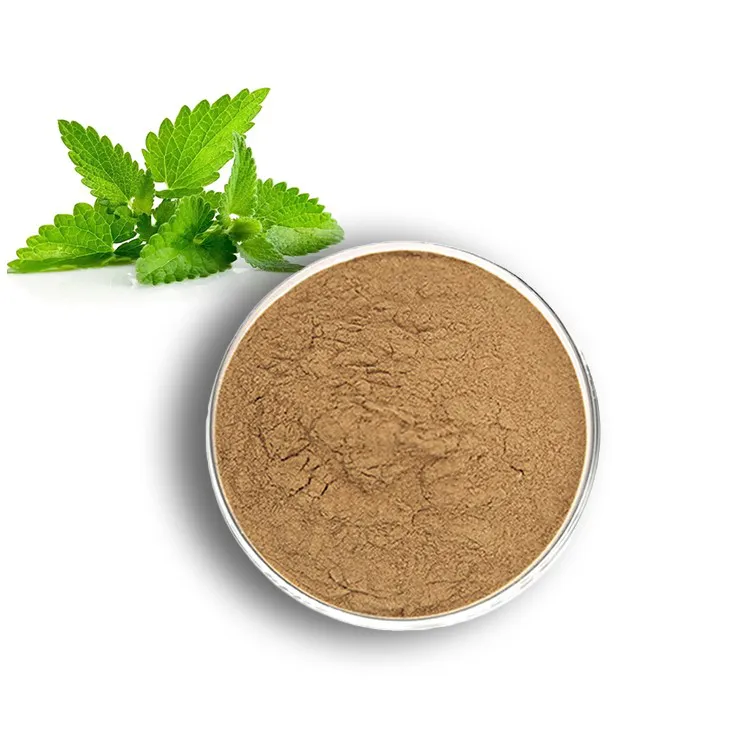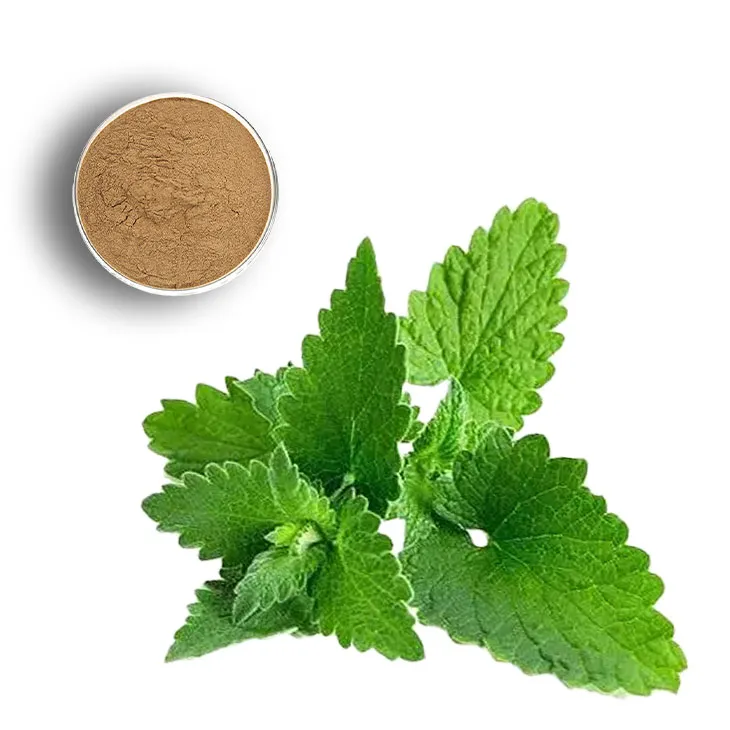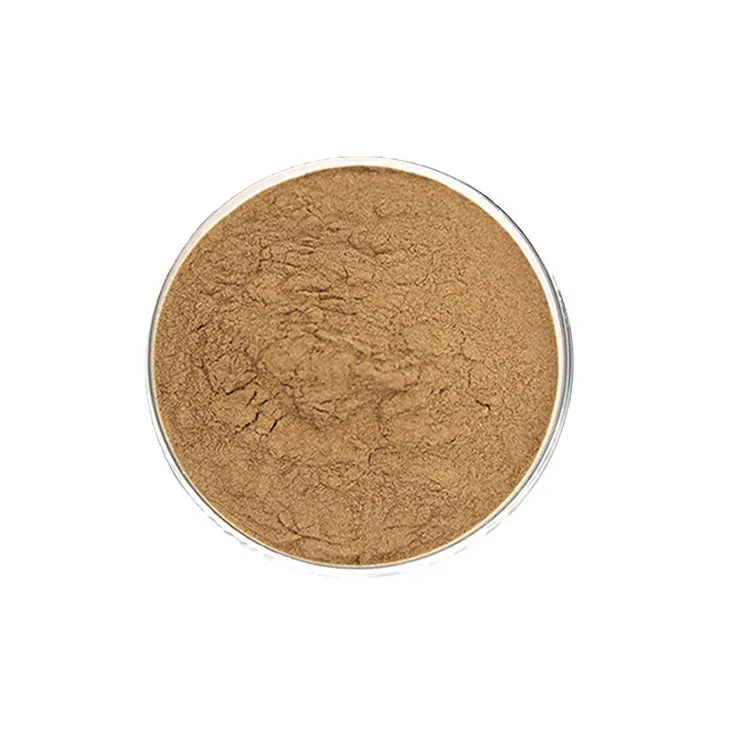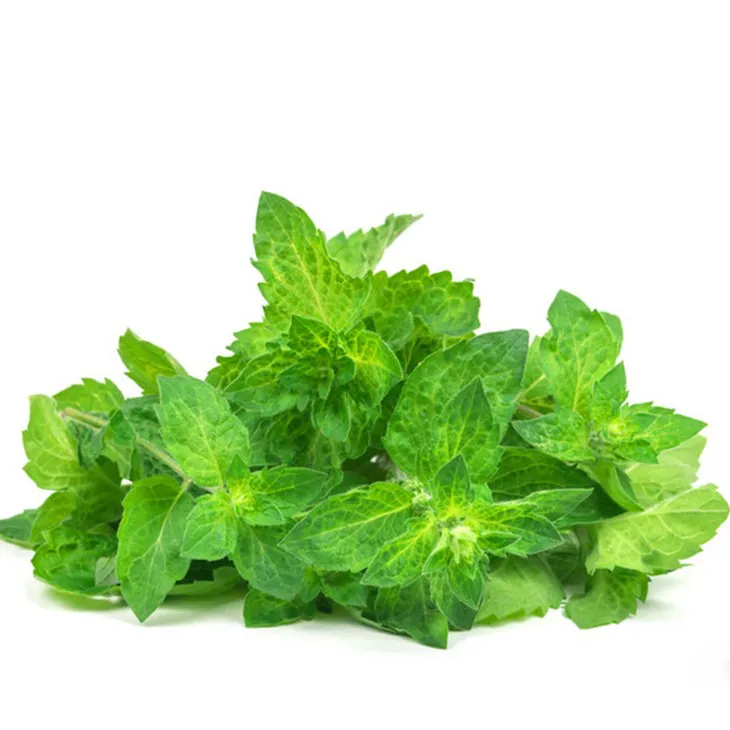- 0086-571-85302990
- sales@greenskybio.com
What is Lemon Balm Extract? Definition, Types, History and Nutritional Value.
2024-12-19

1. Introduction
Lemon Balm Extract is a natural product that has gained significant attention in recent years due to its various beneficial properties. Derived from the lemon balm plant, Melissa officinalis, this extract is rich in bioactive compounds that offer a wide range of potential health benefits. The plant itself is a member of the mint family, Lamiaceae, and is native to Europe, North Africa, and the Middle East. It has a long history of use in traditional medicine, which has led to modern research exploring its many qualities.

2. Definition of Lemon Balm Extract
Lemon Balm Extract is obtained from the leaves of the lemon balm plant. It can be prepared in different ways, resulting in various forms of the extract. Two common types are tinctures and essential oil - based extracts.
2.1 Tinctures
A tincture is typically made by soaking the dried or fresh leaves of the lemon balm plant in a solvent, usually alcohol or a mixture of alcohol and water. This process allows the bioactive compounds in the plant to be extracted into the solvent. Tinctures are often used in herbal medicine as they are easy to administer and can be stored for relatively long periods. The concentration of the active ingredients in a tincture can vary depending on factors such as the ratio of plant material to solvent and the length of the extraction process.
2.2 Essential Oil - based Extracts
Essential oil - based extracts are obtained through a process of steam distillation of the lemon balm leaves. This method separates the volatile, aromatic compounds from the plant material, resulting in a highly concentrated essential oil. The essential oil contains many of the characteristic compounds of lemon balm, such as citral, geraniol, and linalool. These compounds contribute to the plant's characteristic lemon - like scent and are also believed to be responsible for many of its therapeutic effects. However, essential oils are very concentrated and need to be used with caution, usually diluted before application.

3. Types of Lemon Balm Extract
As mentioned earlier, the two main types of lemon balm extract are tinctures and essential oil - based extracts. But there can also be other forms based on different extraction methods and intended uses.
- Standardized Extracts: These are extracts where the concentration of certain key bioactive compounds has been adjusted to a specific level. For example, a standardized lemon balm extract might be formulated to contain a certain percentage of rosmarinic acid, which is one of the important antioxidant compounds in the plant. Standardized extracts are often used in dietary supplements to ensure consistent dosing of the active ingredients.
- Water - based Extracts: Instead of using alcohol or steam distillation, water - based extraction methods can be employed. This type of extract is more suitable for those who prefer to avoid alcohol - based products. Water - based extracts may contain a different profile of bioactive compounds compared to tinctures or essential oils, as some compounds are more soluble in water while others are more soluble in alcohol or are volatile and only obtained through steam distillation.

4. History of Lemon Balm
Lemon balm has a long and rich history of use in traditional medicine across different cultures.
4.1 Ancient Use
The use of lemon balm can be traced back to ancient Greece, where it was known as melissa, which means "bee" in Greek. This name was given because the plant was highly attractive to bees. The ancient Greeks used lemon balm in various ways, including as a medicinal herb to treat wounds, soothe digestive problems, and promote a general sense of well - being. It was also used in perfumes and as an ingredient in love potions.
4.2 Medieval and Renaissance Use
During the medieval and Renaissance periods in Europe, lemon balm continued to be an important herb in medicine. It was often grown in monastery gardens and was used to treat a variety of ailments. It was believed to have a calming effect on the nerves and was used to relieve anxiety, insomnia, and headaches. Monks and herbalists of the time would often recommend lemon balm tea or poultices made from the leaves for these purposes.
4.3 Traditional Use in Other Cultures
In traditional Arabic medicine, lemon balm was used for its digestive and carminative properties. It was also used in Ayurvedic medicine in India, although its use was not as widespread as in European and Arabic traditions. In these different cultural traditions, the plant was often used in combination with other herbs to enhance its therapeutic effects.

5. Nutritional Value of Lemon Balm Extract
Lemon balm extract contains a variety of bioactive compounds that contribute to its nutritional value.
5.1 Antioxidants
One of the most important groups of compounds in lemon balm extract are the antioxidants. Flavonoids, such as luteolin and apigenin, are present in significant amounts. These flavonoids help combat oxidative stress in the body. Oxidative stress occurs when there is an imbalance between the production of reactive oxygen species (ROS) and the body's ability to detoxify them. ROS can damage cells, proteins, and DNA, and are associated with various diseases, including cancer, cardiovascular disease, and neurodegenerative disorders. By scavenging ROS, the flavonoids in lemon balm extract can help protect the body's cells from damage.
5.2 Terpenes
Terpenes are another class of compounds found in lemon balm extract. Compounds like citral, geraniol, and linalool, which are also important components of the essential oil, have antimicrobial, anti - inflammatory, and calming properties. Citral, for example, has been shown to have antibacterial activity against certain strains of bacteria. Geraniol has been studied for its potential anti - inflammatory effects, which may be beneficial in reducing inflammation in the body. Linalool is known for its relaxing and sedative effects, which can help in relieving stress and anxiety.
5.3 Other Compounds
Lemon balm extract also contains other compounds such as rosmarinic acid. Rosmarinic acid is a powerful antioxidant and has anti - inflammatory properties. It has been studied for its potential role in protecting the skin from damage, as well as for its effects on the immune system. Additionally, lemon balm extract contains vitamins and minerals, although in relatively small amounts. These include vitamin C, which is also an antioxidant, and minerals like potassium and magnesium, which are important for various physiological functions in the body.
6. Conclusion
In conclusion, lemon balm extract is a natural product with a long history of use and a diverse range of potential health benefits. Its different types, including tinctures, essential oil - based extracts, standardized extracts, and water - based extracts, offer various options for different applications. The historical use of lemon balm in traditional medicine across cultures provides a basis for modern research into its properties. The nutritional value of lemon balm extract, with its antioxidants, terpenes, and other bioactive compounds, makes it a promising ingredient in the fields of medicine, cosmetics, and the food industry. However, further research is still needed to fully understand the mechanisms of action of these compounds and to explore their potential applications in treating and preventing various diseases.
FAQ:
What are the main bioactive compounds in lemon balm extract?
Lemon balm extract contains a variety of bioactive compounds. The main ones are flavonoids, which are antioxidants. These flavonoids play an important role in combating oxidative stress in the body. Additionally, it also contains other compounds like terpenes, which contribute to its characteristic aroma and may have their own biological activities.
How is lemon balm tincture made?
A lemon balm tincture is typically made by soaking the dried or fresh lemon balm plant in a solvent, usually alcohol (such as ethanol). The plant material is left in the alcohol for a period of time, allowing the bioactive compounds to dissolve into the alcohol. After this steeping process, the liquid is strained to remove the plant debris, leaving behind the tincture which contains the concentrated extract of lemon balm.
What are the traditional uses of lemon balm extract?
In traditional medicine, lemon balm extract has been used for its calming effects. It has been known to help reduce stress and anxiety. Also, it has been used for digestive - enhancing properties, helping with issues such as indigestion, bloating, and nausea. Some traditional practices also used it for its potential antibacterial and antiviral properties, though more research is needed to fully confirm these aspects in a modern scientific context.
Can lemon balm extract be used in cooking?
Yes, lemon balm extract can be used in cooking. The essential oil - based extract can add a lemony and herbal flavor to dishes. It can be used in small amounts in salad dressings, marinades, and desserts. However, it should be used sparingly as the flavor can be quite strong. The tincture form is not typically used in cooking due to the alcohol content.
How does lemon balm extract compare to other herbal extracts in terms of antioxidant activity?
Compared to other herbal extracts, lemon balm extract has a significant antioxidant activity due to its flavonoid content. However, different herbal extracts have their own unique combinations of bioactive compounds, so the antioxidant activity can vary depending on the specific compounds present and their concentrations. For example, Green Tea Extract is also known for its high antioxidant activity, but it contains different types of catechins compared to the flavonoids in lemon balm extract. Each herbal extract may have its own potential health benefits related to antioxidant activity.
Related literature
- The Chemical Composition and Biological Activity of Lemon Balm (Melissa officinalis L.)"
- "Lemon Balm: A Review of Its Traditional Use, Phytochemistry, Pharmacology, and Clinical Applications"
- ▶ Hesperidin
- ▶ citrus bioflavonoids
- ▶ plant extract
- ▶ lycopene
- ▶ Diosmin
- ▶ Grape seed extract
- ▶ Sea buckthorn Juice Powder
- ▶ Beetroot powder
- ▶ Hops Extract
- ▶ Artichoke Extract
- ▶ Reishi mushroom extract
- ▶ Astaxanthin
- ▶ Green Tea Extract
- ▶ Curcumin Extract
- ▶ Horse Chestnut Extract
- ▶ Other Problems
- ▶ Boswellia Serrata Extract
- ▶ Resveratrol Extract
- ▶ Marigold Extract
- ▶ Grape Leaf Extract
- ▶ blog3
- ▶ blog4
- ▶ blog5
-
Pure 85% Tomentil Extract.
2024-12-19
-
Shikonin
2024-12-19
-
Citrus bioflavonoids
2024-12-19
-
Quercetin
2024-12-19
-
Peppermint Extract Powder
2024-12-19
-
Dan Shen Root Extract/Salvia Root Extract
2024-12-19
-
Pomegranate Extract
2024-12-19
-
Saw Palmetto Extract
2024-12-19
-
Tamarind extract powder
2024-12-19
-
Aminolevulinic acid
2024-12-19
-
Eyebright Extract
2024-12-19





















